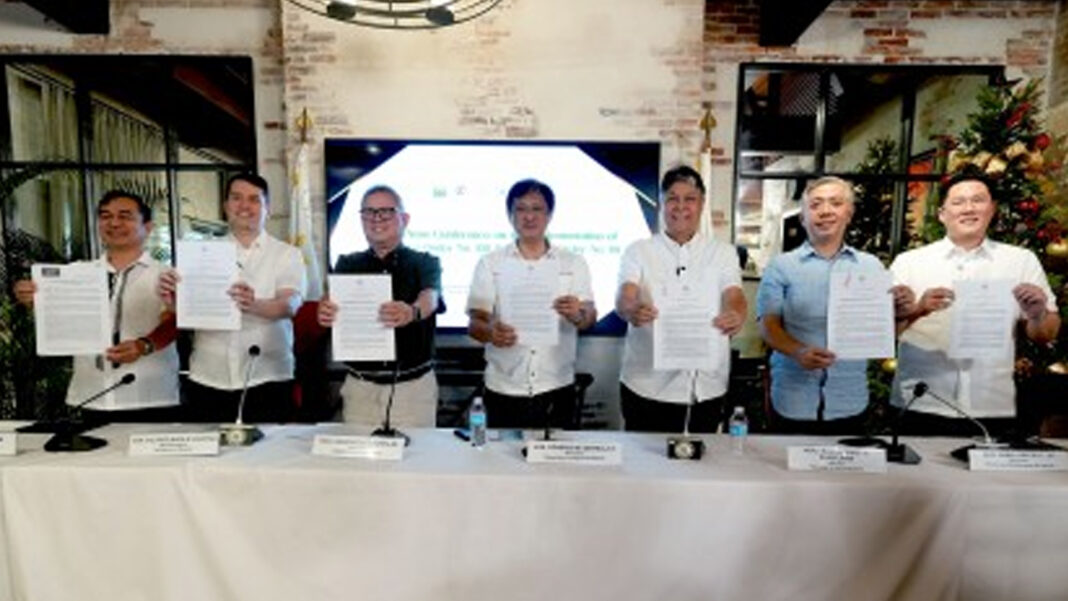The government has formed an inter-agency steering committee to ensure the smooth implementation of the palay (unhusked rice) floor price under Executive Orders (EO) 100 and 101, as part of the current administration’s effort to stabilize rice prices, help farmers earn, and protect them from unfair trading practices.
In a joint press briefing on Thursday, Department of Agrarian Reform Secretary Conrado Estrella III stressed the importance of the twin EOs signed by President Ferdinand R. Marcos Jr. on Oct. 25.
He said that together with the Department of Agriculture (DA), the National Food Authority (NFA), the departments of the Interior and Local Government (DILG), Trade and Industry (DTI), and Social Welfare and Development, already made a draft that was submitted to Malacanang.
“Ang pakay unang una, na lahat ng mga national government agencies katulad ng mga iba-iba department, DSWD, DepEd, lalo na ang DSWD, ang pinakamalaking ahensya na namimili ng bigas at saka napakabilis ng turn over, ganoon din ang mga government-owned and controlled corporations, ganon din ang mga state universities and colleges at lahat ng local government units na kinakailangan na pag bumibili sila ng palay, ng bigas, kailangan na ang kanilang bibilhing mga bigas ay magmumula sa palay na itinanim ng mga kamay ng mga magsasakang Pilipino. At yan ang gusto namin ma-achieve (The goal is first and foremost, that all national government agencies like the various departments, DSWD, DepEd, especially DSWD, the largest agency that buys rice and then the turnover is very fast, the same goes for government-owned and controlled corporations, the same goes for state universities and colleges and all local government units that when they buy rice, the rice, the rice they buy must come from rice planted by the hands of Filipino farmers. And that is what we want to achieve),” Estrella said.
Moreover, he said the floor pricing, as defined in the EOs, would assure bigger income for the farmers.
He said the concerned government agencies have agreed to organize a technical working group or a steering committee to oversee the enforcement and nationwide compliance monitoring of the EOs.
Estrella explains that EO 100 was issued following a special caucus at the DAR last October that addressed the sharp decline in palay farmgate prices.
The order mandates the DA to set and regularly adjust a minimum buying price for palay based on actual production costs, market conditions, and farmer welfare, supported by consultations and data from the multi-agency committee.
The DAR said the measure also authorizes the temporary use of public facilities such as covered courts, gymnasiums, and multipurpose halls as storage areas to prevent post-harvest losses and maintain grain quality.
Both Estrella and Agriculture Secretary Francisco Tiu Laurel Jr. said entities purchasing palay below the established floor price, which is PHP17 to PHP23 per kg. for wet, and PHP23 to PHP30 per kg. for dried, may face administrative sanctions under existing laws.
Estrella said EO 100 would guarantee farmers fair compensation for their produce and shield them from market price manipulation.
It would also help stabilize the rice market and prevent sudden price surges during harvest season, which would benefit consumers.
Complementing this, EO 101 orders the full implementation of Republic Act 11321 or the Sagip Saka Act, to boost the income of farmers and fisherfolk through enterprise development and direct government procurement.
Senator Francis Pangilinan, author of Sagip Saka Act said the EO would allow agencies, state universities and colleges, and local government units to buy agricultural products directly from accredited cooperatives and farmers’ organizations without public bidding.
Under EO 101, the Farmers and Fisherfolk Enterprise Development (FFED) Program aims to build the capacity of farmers and fisherfolk, expand market access, support enterprise development, and promote sustainable livelihoods.
The FFED Council, meanwhile, will monitor implementation and submit biannual progress reports to the President.
For its part, Estrella said DAR, with its list of all ARBs and agrarian reform beneficiaries nationwide will also help in the monitoring and ensure compliance.
The DA, meanwhile, said farmers, ARBs, and ARBOs may register with the DA for them to be included in the list.
“Ang laki kasing bulk ng binibili ng ating gobyero, lalo na yung bigas. Isipin na lang natin na yung bigas na binibili nila kung lahat yan ay galing sa mga itinanim ng ating mga magsasaka, ang laking boost niya at maganda pa ang presyo so maassure sila ng presyo at the same time merong market para sa ating mga nagtatanim ng palay (The government buys a big bulk of agricultural products, especially rice. Just imagine that if the rice they buy is directly from the farmers, it will be a big boost and the price will be good so they will be assured of the price and at the same time there will be a market for our rice growers),” Estrella said. (PNA)


